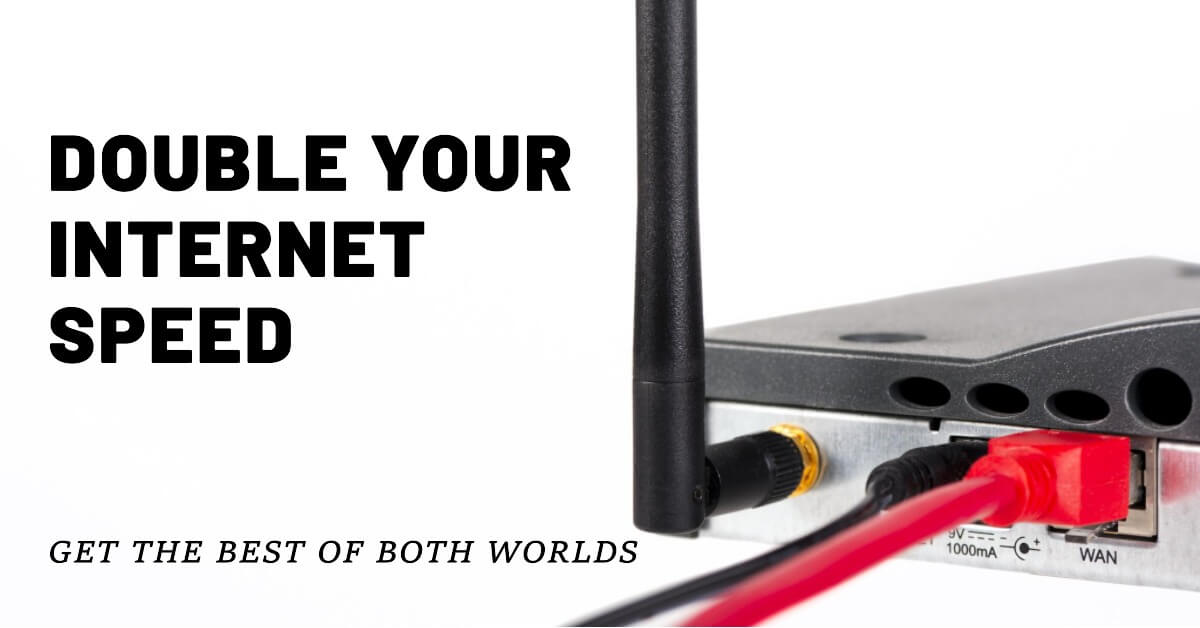It’s a valid question to ask- can you have two Internet providers in one house? The answer is yes, but there are a few things you need to take into consideration before making the switch. For starters, each provider will require their own modem and router.
This means more hardware and cords running through your home, which can be unsightly and difficult to manage. You’ll also need to contact each provider to cancel or transfer service, which can be a hassle. Finally, you’ll need to make sure both providers offer compatible speeds so you can get the most out of your new dual-Internet setup.
- Research internet providers in your area to find the best deals and coverage for your needs
- Call each provider to ask about their rates, coverage, and any special offers they may have
- Once you’ve decided on two providers, contact each one to set up service at your home
- Most providers will require you to have a separate modem for each account, so be sure to factor that into your budget when making your decision
- Enjoy having two reliable internet connections at your home!
Can You Have 2 Internet Providers at the Same Address?
Yes, you can have two Internet providers at the same address. This is called “dual-homing” and it provides redundancy in case one of your providers has an outage. It also allows you to get the best possible speeds from each provider by using their networks in parallel.
However, there are a few things to keep in mind if you want to set up dual-homing: First, you’ll need two separate modems (one for each provider) and two separate router/firewall devices (again, one for each provider). You’ll also need to make sure that your home network is configured properly so that traffic can flow between the two providers.
Finally, you may want to consider using a quality of service (QoS) system to ensure that your critical applications always have enough bandwidth. Dual-homing can be a great way to get the most out of your Internet connection, but it’s important to do it right. If you have any questions about setting up dual-homing at your home or business, feel free to contact us for more information.
Can You Have 2 Wifis in One House?
Having two Wi-Fi networks in one house can be very helpful in a number of situations. For example, if you have a lot of devices that need to be connected to the internet, having two Wi-Fi networks can help reduce congestion and improve speeds. Additionally, if you have guests over often, it can be helpful to have a second Wi-Fi network that they can use so that your main network is not overloaded.
There are a few things to keep in mind when setting up two Wi-Fi networks in one house, however. First, you will need two separate routers (or one router with dual bands). Second, you will need to make sure that each router has its own unique SSID (name) and password.
Finally, you may want to consider using different channels for each router to further reduce congestion. If you follow these tips, you should be able to successfully set up two Wi-Fi networks in your home!
Can You Have Two Different Wi-Fi Providers in One House
If you live in a rural area, or your internet service provider (ISP) doesn’t offer the speeds you need, you may be wondering if you can have two different Wi-Fi providers in your home. The answer is yes! There are a few different ways to go about it, and we’ll walk you through each one.
One option is to use a second router as a range extender. This will boost the signal from your primary router and extend the reach of your WiFi network. You can also use this method if you want to separate your WiFi networks for security reasons – for example, if you want to keep your work devices on a separate network from your personal ones.
Another option is to set up a mesh network. This uses multiple nodes that work together to create a single strong WiFi signal throughout your home.Mesh networks are becoming increasingly popular, and they’re a great solution if you have dead spots in your home where the WiFi signal isn’t strong enough. Finally, you can also use Powerline adapters.
These plug into your electrical outlets and create a wired connection that can be used for WiFi access points or other devices like TVs or gaming consoles. Powerline adapters are great because they don’t require any extra wiring – just plug them in and they’re ready to go! No matter which method you choose, setting up two different WiFi networks in your home is easy and will give you the flexibility and speed that you need.
Final Words
It’s possible to have two Internet providers in one house, but it isn’t necessarily recommended. There can be potential problems with having two providers, such as slower speeds and higher costs. If you do decide to have two providers, it’s important to choose different types of services so that you can get the best possible connection.


Leave a Reply